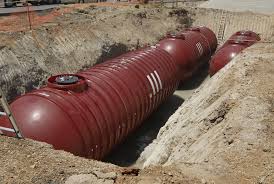Working in excessive heat can cause illness, whether outdoors (this summer again brought record-breaking heat to parts of North America), or indoors where equipment, combustion or other factors raise ambient working temperatures. Occupational safety and health agencies have slowly been expanding explicit requirements that employers protect their workers against heat stress. Most recently, the Maryland Department of Occupational Safety and Health (MOSH) adopted Heat Stress Standards effective September 30, 2024 (COMAR 09.12.32).
Audit, Compliance and Risk Blog
Maryland creates heat stress rules for indoor and outdoor work
Posted by Jon Elliott on Mon, Dec 23, 2024
Tags: OSHA, Heat, Maryland heat stress standards, MOSH heat regulations, Workplace heat protection, Heat index compliance, Occupational safety and heat illness, Heat stress prevention plan, High-heat procedures, OSHA proposed heat standards
In the early 1980s, serious groundwater contamination incidents arising from leaking underground storage tanks (USTs) prompted federal and state lawmakers to issue standards for UST construction, installation, and removal, and to require the registration and monitoring of USTs. In 1984, Congress adopted a national program to regulate USTs storing petroleum and hazardous substances (“federal UST Law”). The US Environmental Protection Agency (EPA) creates national standards, which are implemented under delegation by states, the District of Columbia, and territories). The remainder of this note summarizes federal UST requirements; states can generally establish and administer stricter requirements.
Read MoreTags: environmental protection, Environmental Compliance, EPA Regulations, Groundwater Protection, Petroleum Storage, Underground Storage Tanks (USTs), Federal UST Law, Hazardous Substances, Compliance Checklist, EPA Standards
California enacts first US extended producer responsibility law for apparel and textiles
Posted by Jon Elliott on Tue, Dec 10, 2024
California has just enacted the first statewide “extended producer responsibility” (EPR) law addressed to “apparel” and “textile articles” (“Responsible Textile Recovery Act of 2024” (SB 707, Newman). SB 707 will require manufacturers of targeted materials to ensure their recovery and recycling. California’s new program will be administered by the state Department of Resources Recycling and Recovery (CalRecycle), which oversees solid waste management (including recycling and other EPR programs) in the state. The EPR approach to recycling – also called “product stewardship” –has been extending to new waste streams in recent years; the national advocacy group Product Stewardship Institute identifies 141 such programs spread among 33 US states (I provide an overview of these US state efforts HERE). The remainder of this note summarizes this new law.
Read MoreTags: Environment, California Environmental Law, Textile Recycling, Environmental Compliance, Extended Producer Responsibility (EPR), Responsible Textile Recovery Act, Sustainable Fashion, Apparel Waste Management, Waste Reduction
Radon gas is released naturally by radioactive decay within rock formations, from where it can percolate to the surface and infiltrate basement and trenching, and then produce hazardous concentrations if trapped or spread throughout the structure by the ventilation system. Because of its radioactive origin, radon can pose health risks – it’s the leading cause of lung cancer in non-smokers. The US Environmental Protection Agency (EPA) administers extensive information programs, which encourage in-building testing (especially in housing), and provides guidance for hazard reduction. EPA’s authority derives primarily from the Indoor Radon Abatement Act of 1988 (codified as Title III of the Toxic Substances Control Act (TSCA)). In addition, the Occupational Safety and Health Administration (OSHA) considers radon a type of ionizing radiation subject to worker protection requirements. The remainder of this note provides background to radon hazards and their management, referencing information from EPA, OSHA and other agencies and professional organizations.
Read MoreTags: OSHA, Environmental risks, Environmental, EPA, workplace safety, Environment, Environmental Policy, Hazardous Chemicals
EPA guidance on indoor ventilation protections against viruses
Posted by Jon Elliott on Wed, Nov 20, 2024
The US Environmental Protection Agency’s (EPA’s) Indoor Air Quality (IAQ) program offers guidance how to use ventilation to help prevent the spread of respiratory viruses in “indoor public spaces” including offices and commercial locations. As north America approaches winter months when more people spend more time indoors, it’s a good time to review these suggestions. The rest of this note summarizes EPA guidance.
Read MoreTags: EPA, clean air, workplace safety, Indoor Air Quality, Health and Safety Compliance, IAQ, Ventilation Strategies, Respiratory Virus Prevention
California revises greenhouse gas emission and financial risk reporting laws
Posted by Jon Elliott on Tue, Nov 12, 2024
On September 27, 2024, California’s governor Gavin Newsom signed Senate Bill (SB) 219, amending greenhouse gas (GHG) emission reporting requirements for targeted organizations doing business in the state, enacted in 2023 (SB 253 (Wiener) (Climate Corporate Data Accountability Act) and SB 261 (Stern)) and initially scheduled to require compliance beginning January 1, 2025. (I wrote about them HERE) SB 219 revises and delays emissions reporting requirements. The revised requirements will still be administered by the California Air Resources Board (ARB), expanding its longstanding air quality and climate authority (GHG provisions center on the Global Warming Solutions Act of 2006 ((AB 32)). The remainder of this note discusses the revisions made by SB 219.
Read More
Tags: California Legislation, Environmental risks, Environmental, Greenhouse Gas, Environmental Projects, California, Environment, Environmental Policy
EPA issues Herbicide Strategy to protect endangered species from pesticides
Posted by Jon Elliott on Fri, Nov 01, 2024
In recent years, the US Environmental Protection Agency (EPA) has reviewed its overlapping responsibilities to regulate pesticides under the Federal Insecticide, Fungicide and Rodenticide Act (FIFRA), and to protect endangered and threatened species under the Endangered Species Act (ESA). In August, EPA completed its latest step in these efforts by issuing its “Herbicide Strategy to Reduce Exposure of Federally Listed Endangered and Threatened Species and Designated Critical Habitats from the Use of Conventional Agricultural Herbicides” (Herbicide Strategy). The rest of this note summarizes the Herbicide Strategy, and provides context regarding EPA’s FIFRA and ESA authorities.
Read MoreTags: Environmental risks, Environmental, EPA, Environmental Projects, Environment, Environmental Policy, environmental protection
Agencies provide hurricane preparation and response guidance
Posted by Jon Elliott on Fri, Oct 25, 2024
In October, the US Occupational Safety and Health Administration (OSHA) and other federal agencies reacted to hurricanes in the Southeast by re-highlighting existing guidance to support preparation for potential hurricanes, and to respond if one occurs. OSHA’s guidance is directed at employers, the National Oceanic and Atmospheric Administration (NOAA) and the Environmental Protection Agency (EPA) provide more generalized guidance, and the Centers for Disease Control and Prevention (CDC) target families. The rest of this note summarizes this timely information, centering on OSHA’s offerings.
Read MoreTags: Health & Safety, OSHA, Environmental risks, Environmental, Environment, Weather, weather safety, hurricane
OSHA issues safety standards for the design and use of portable powered tools and other handheld equipment items. (29 CFR 1910.242 – 1910.244). These standards focus on safe use of powered hand tools, as well as on safety features such as lock-outs and guards. The standards define general requirements for all equipment defined as powered hand tools, including specific definitions for following: explosive-actuated; fastening tools; abrasive wheels; and jacks. The remainder of this note summarizes these requirements.
Read MoreTags: Health & Safety, OSHA, Safety and Health at Work, workplace safety
EPA reinstates “Once in Always in” policy for major sources of hazardous air pollutant emissions
Posted by Jon Elliott on Wed, Oct 09, 2024
The Clean Air Act (CAA) directs the Environmental Protection Agency (EPA) to define “hazardous air pollutants (HAPs)” that may pose acute health hazards, and to impose regulations to reduce those hazards. Controls include permits for “major sources” of HAPs based on “Maximum Achievable Control Technologies (MACT),” and lesser controls for non-major “area sources.” Effective September 10, 2024 EPA has reinstated a policy that an emission source that met major source criteria at the time an applicable MACT became effective is “once in, always in” – even if a source makes binding changes reducing its “potential to emit” below the applicable major source threshold, it still cannot formally requalify as a less-regulated area source. This policy was in force from 1995 until EPA reversed it in January 2018 to allow full reclassification. EPA subsequently codified this approach in a rule issued in 2020. However, EPA has now revised that rule to reinstate “once in, always in.” The rest of this note summarizes CAA requirements for HAP sources, and the latest change.
Read MoreTags: Environmental risks, CAA, clean air, Air Toxics, Environment, Clean Air Act, environmental protection










